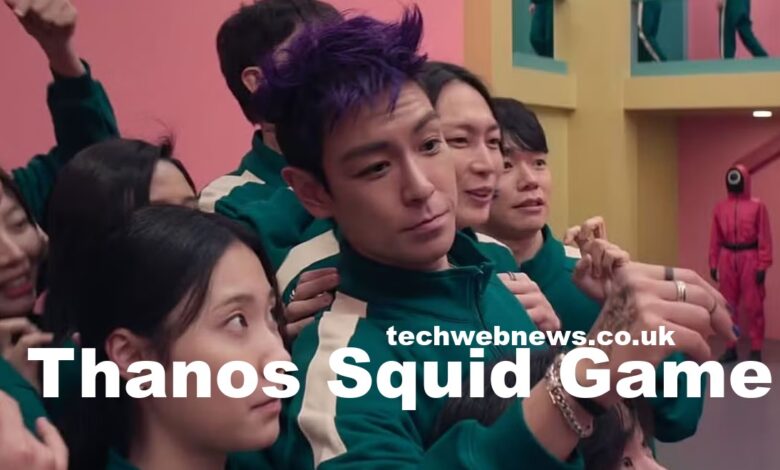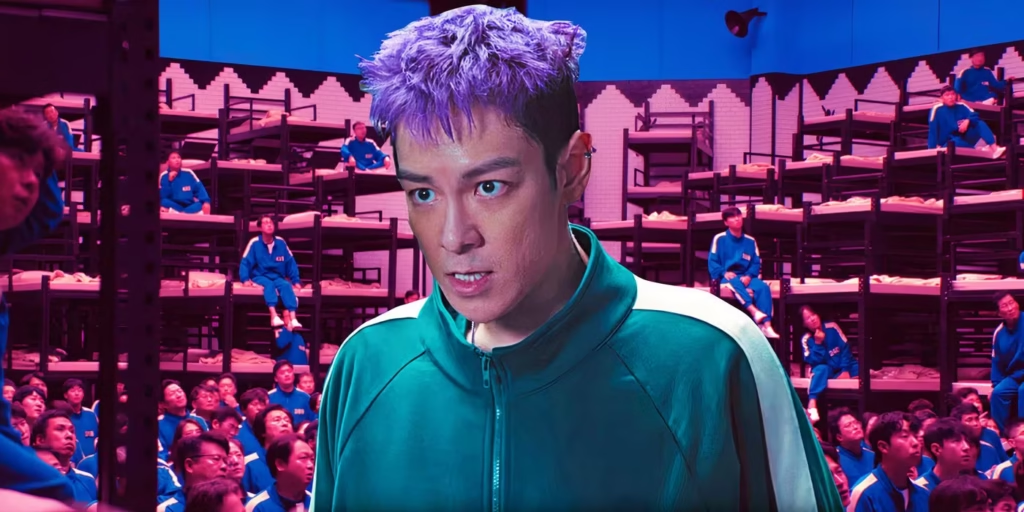Thanos Squid Game: When Two Worlds of Pop Culture Collide

Introduction to the Thanos Squid Game Phenomenon
Thanos Squid Game In the ever-expanding world of pop culture, mashups are no longer rare — they’re celebrated. One of the strangest yet most fascinating ideas to emerge is the “Thanos Squid Game” crossover. On one hand, we have Thanos, the infamous Marvel villain who wiped out half the universe with a single snap. On the other, we have Squid Game, the brutal Netflix survival drama where players risk their lives for money. Putting these two universes together sounds like chaos, but it’s exactly the kind of imaginative crossover that fans love to discuss.
The concept of Thanos stepping into the Squid Game isn’t official, but fan theories, memes, and online discussions have made it a hot topic. It symbolizes the way modern audiences like to blend genres and characters, creating new layers of meaning. Would Thanos survive Squid Game? Or would he rewrite its rules altogether? These playful questions make the crossover intriguing.
At the heart of it, “Thanos Squid Game” is more than just a meme. It represents how storytelling, fandom, and internet culture merge to keep entertainment alive long after the credits roll.
Why Thanos Fits Perfectly Into the Squid Game World

Thanos, despite being a cosmic-level villain, shares surprising similarities with the tone of Squid Game. He isn’t just a mindless destroyer—he has his own twisted philosophy about balance and fairness. In the Marvel universe, he believed erasing half of life was necessary to save the universe from overpopulation and resource scarcity. As horrifying as it sounds, his logic wasn’t rooted in chaos but in order.
Squid Game, too, thrives on warped ideas of fairness. The organizers design games where everyone starts with equal chances, but survival depends on skill, luck, and often betrayal. Just like Thanos, the masterminds of Squid Game think they’re leveling the playing field, even though the methods are cruel. This shared obsession with balance makes Thanos a natural fit in the Squid Game arena.
If you think about it, Thanos might even approve of Squid Game’s twisted philosophy. Instead of wiping out half the population instantly, Squid Game lets the players decide their fate in a brutal yet structured system. The combination is chilling, but also fascinating to imagine.
What Would Happen if Thanos Played Squid Game?
The fun part of the “Thanos Squid Game” idea is imagining how it would actually play out. Would Thanos be just another contestant, stripped of his powers, competing for survival? Or would he enter as the ultimate game master, enforcing his own rules on the players?
If Thanos were a contestant without the Infinity Gauntlet, he would still have an edge. His sheer strength, intelligence, and determination would make him a formidable opponent. Red Light, Green Light? He’d probably ace it without breaking a sweat. Tug of War? His brute power alone would crush the competition. Even in games that rely on strategy, Thanos has always proven himself as a calculating thinker. It’s hard to imagine him losing.
On the other hand, if Thanos took the role of the game master, the Squid Game would become even darker. Instead of monetary prizes, he might offer survival itself. Players wouldn’t just fight for money—they’d fight for the right to exist in his rebalanced universe. It’s a terrifying concept, but one that aligns with Thanos’ view of justice.
The Symbolism Behind Thanos in Squid Game
When we put Thanos in the Squid Game context, it’s not just about fanfiction—it also opens the door to symbolic interpretation. Both characters and narratives deal with themes of inequality, survival, and moral ambiguity.
Thanos represents ultimate control: a single being deciding the fate of countless lives. Squid Game represents systemic control: an invisible system forcing individuals into deadly choices. In both cases, the powerless are caught in a game they never asked to play. This parallel explains why the mashup resonates so strongly with audiences.
Fans who enjoy combining these worlds aren’t just looking for fun crossovers—they’re also exploring how similar themes appear across different stories. It’s a way of highlighting how pop culture reflects deeper social anxieties about fairness, power, and survival.
Memes and Fan Creations: Fueling the Thanos Squid Game Trend
The internet thrives on mashups, and the “Thanos Squid Game” idea has spread largely thanks to memes. Artists, video editors, and fans have created visuals showing Thanos in the infamous green tracksuit or facing off in games like Honeycomb and Marbles. These creations are both humorous and thought-provoking, giving fans a chance to reimagine their favorite characters in absurd scenarios.
TikTok edits, YouTube parodies, and Instagram fan art have all contributed to the crossover’s popularity. Some creators even animate full sequences of Thanos competing in Squid Game challenges, adding dramatic music and dialogue for comedic effect. The creativity shows just how powerful fandom communities can be in keeping ideas alive.
What’s interesting is how these memes aren’t just for laughs. They spark discussions about who would win, what strategies Thanos would use, and how Squid Game’s rules might change under his watch. It’s fan engagement at its finest, blending humor with serious speculation.
Could Thanos Actually Lose in Squid Game?
As invincible as Thanos seems, the idea of him losing in Squid Game is an intriguing twist. After all, Squid Game isn’t just about physical power—it’s about human vulnerability, trust, and betrayal. Even the strongest players in the series often failed because they couldn’t predict the human factor.
Imagine Thanos in the Marbles game, where brute strength doesn’t matter. The challenge relies on deception, strategy, and sometimes luck. Could Thanos Squid Game outwit his opponent, or would his ego get in the way? Similarly, in the Glass Bridge game, his power wouldn’t guarantee survival—sometimes luck is the only deciding factor.
These possibilities remind us that even the strongest figures in fiction can be humbled by systems designed to strip away their advantages. That’s part of what makes the crossover so fun to imagine: it levels the playing field in unexpected ways.
The Broader Appeal of Crossover Concepts Like Thanos Squid Game
The popularity of “Thanos Squid Game” is part of a larger trend in pop culture. Audiences love mixing characters and worlds because it challenges expectations. When you put two powerful franchises together, you create new narratives that neither story could achieve alone.
Crossovers also let fans take control of storytelling. Instead of waiting for official collaborations, communities create their own versions, fueling creativity and keeping franchises relevant. These mashups show how modern audiences don’t just consume media passively—they actively shape it.
“Thanos Squid Game” might never happen officially, but its popularity proves the strength of fan-driven content. It’s a reminder that fandom is no longer a side activity—it’s a major force in global entertainment.
Conclusion: Why Thanos Squid Game Captures Our Imagination
At first glance, the idea of Thanos Squid Game might seem absurd. What does a cosmic villain have in common with a Korean survival drama? But once you dig deeper, the crossover makes perfect sense. Both explore fairness, control, and survival, albeit in very different ways.
Imagining Thanos as a contestant—or even a game master—adds layers of intrigue to both stories. It sparks memes, art, and discussions that keep fans entertained while highlighting deeper themes about power and inequality.
In the end, Thanos Squid Game is more than just a meme. It’s proof of how powerful crossovers can be, not only in creating entertainment but also in reflecting cultural anxieties. And who knows? With the way entertainment is evolving, maybe one day we’ll actually see a Marvel cameo in a Squid Game spin-off. Until then, fans will keep imagining—and creating—their own versions of this unforgettable mashup.



